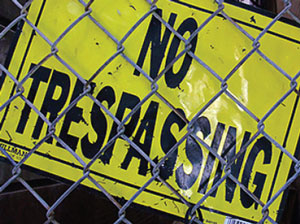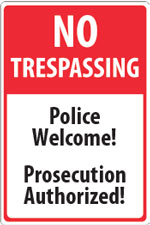
A Trespass Letter of Consent lets the police act for you if someone is on your private property without permission. With this letter, police don’t have to call you first before asking the person to leave or making them leave.
Normally, police can’t remove someone from private property unless the owner says it’s okay. If the owner isn’t there or can’t be reached—especially late at night—this can be a problem.
This letter helps by giving police permission ahead of time. That way, they can act right away if someone is trespassing, even when you’re not available.
How do I put a letter on file?
If a Trespass Letter of Consent would be helpful to you, complete the online form below.
In addition to your consent letter, your property must be posted with ‘No Trespassing’ signs. Signs may include the Trespass authority under ORS 164.245 (property) or ORS 164.255 (building/dwelling). These signs should not include any language specific to loitering.
What happens next?
Should an officer respond to your property, the trespass file is available for officers to quickly determine if there is a current letter on file. The officer can then take appropriate action.
What happens if police arrest someone based on my signed letter?
 In some cases, officers are able to resolve trespass complaints without arresting the involved person. However, there are situations where the officer has no choice but to cite or arrest an offender. In those instances, you will be expected to be available for any resulting court action.
In some cases, officers are able to resolve trespass complaints without arresting the involved person. However, there are situations where the officer has no choice but to cite or arrest an offender. In those instances, you will be expected to be available for any resulting court action.
What if my property is a multi-dwelling complex?
 A trespass letter is generally ineffective for multi-dwelling complexes. A resident may “invite” whomever they choose to visit them at their residence; however, land-lords/property managers are encouraged to post all of their property entrances with signs that identify who may be on their property; e.g. “No Trespassing except tenants and invited guests. Police welcome.”
A trespass letter is generally ineffective for multi-dwelling complexes. A resident may “invite” whomever they choose to visit them at their residence; however, land-lords/property managers are encouraged to post all of their property entrances with signs that identify who may be on their property; e.g. “No Trespassing except tenants and invited guests. Police welcome.”
What happens if I change my mind or sell my property?
If the status of your property changes in any way, we ask that you notify us in writing of your desire to terminate the trespass letter. This termination notice can be faxed to 541-928-6692 or delivered/mailed to:
Community Resource Unit Supervisor
Albany Police Department
2600 Pacific Boulevard SW
Albany, OR 97321
What is the law regarding trespass?
Generally, a person commits the offense of Criminal Trespass if the person enters or remains unlawfully in or upon premises when such premises are not open to the public; or the person fails to leave premises that are open to the public after being lawfully directed to do so by the person in charge. Refer to Oregon Revised Statutes (ORS) 164.245 and 164.255.
Oregon Revised Code (ORS) 164.245 & 164.255
164.245 Criminal trespass in the second degree.
(1) A person commits the crime of criminal trespass in the second degree if the person enters or remains unlawfully in a motor vehicle or in or upon premises.
164.255 Criminal trespass in the first degree.
(1) A person commits the crime of criminal trespass in the first degree if the person:
(a) Enters or remains unlawfully in a dwelling;
(b) Having been denied future entry to a building pursuant to a merchant’s notice of trespass, reenters the building during hours when the building is open to the public with the intent to commit theft therein;
(c) Enters or remains unlawfully upon railroad yards, tracks, bridges or rights of way; or
(d) Enters or remains unlawfully in or upon premises that have been determined to be not fit for use under ORS 453.855 to 453.912.
(2) Subsection (1)(d) of this section does not apply to the owner of record of the premises if:
(a) The owner notifies the law enforcement agency having jurisdiction over the premises that the owner intends to enter the premises;
(b) The owner enters or remains on the premises for the purpose of inspecting or decontaminating the premises or lawfully removing items from the premises; and
(c) The owner has not been arrested for, charged with or convicted of a criminal offense that contributed to the determination that the premises are not fit for use.
Definitions: As used for ORS 164.205 to 164.270
(A) “Open to the public” means premises which by their physical nature, function, custom, usage, notice or lack thereof or other circumstances at the time would cause a reasonable person to believe that no permission to enter or remain is required.
(B) “Person in charge” means a person, a representative or employee of the person who has lawful control of premises by ownership, tenancy, official position or other legal relationship. “Person in charge”includes, but is not limited to the person, or holder of a position, designated as the person or position-holder in charge by the Governor, board, commission or governing body of any political subdivision of this state.
(C) “Premises” includes any building and any real property, whether privately or publicly owned.
How can I minimize property damage and theft?
- Post “No Trespassing” signage
- Install motion-activated lighting
- Provide on-site supervision
- Install video surveillance
- Maintain property with low or no brush/tall grass
- Install locks/gates/fences
- Join our Neighborhood Watch Program
- Repair damage and graffiti immediately






